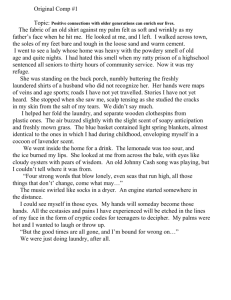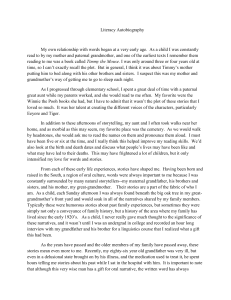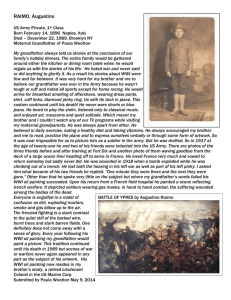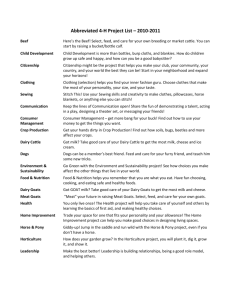Word
advertisement
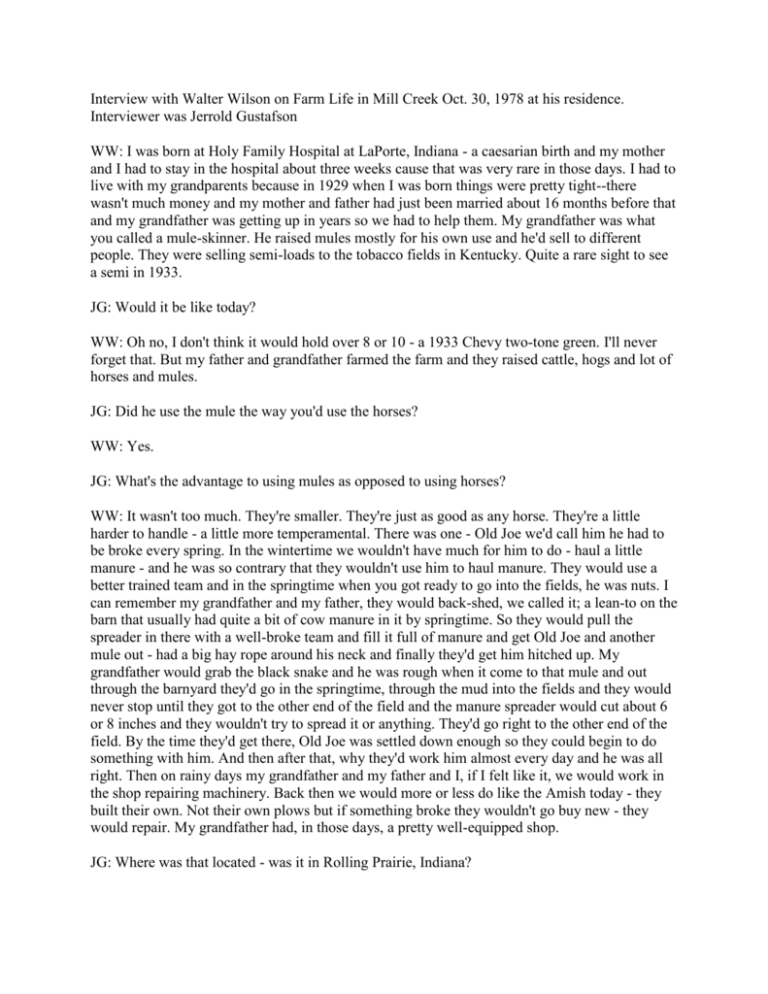
Interview with Walter Wilson on Farm Life in Mill Creek Oct. 30, 1978 at his residence. Interviewer was Jerrold Gustafson WW: I was born at Holy Family Hospital at LaPorte, Indiana - a caesarian birth and my mother and I had to stay in the hospital about three weeks cause that was very rare in those days. I had to live with my grandparents because in 1929 when I was born things were pretty tight--there wasn't much money and my mother and father had just been married about 16 months before that and my grandfather was getting up in years so we had to help them. My grandfather was what you called a mule-skinner. He raised mules mostly for his own use and he'd sell to different people. They were selling semi-loads to the tobacco fields in Kentucky. Quite a rare sight to see a semi in 1933. JG: Would it be like today? WW: Oh no, I don't think it would hold over 8 or 10 - a 1933 Chevy two-tone green. I'll never forget that. But my father and grandfather farmed the farm and they raised cattle, hogs and lot of horses and mules. JG: Did he use the mule the way you'd use the horses? WW: Yes. JG: What's the advantage to using mules as opposed to using horses? WW: It wasn't too much. They're smaller. They're just as good as any horse. They're a little harder to handle - a little more temperamental. There was one - Old Joe we'd call him he had to be broke every spring. In the wintertime we wouldn't have much for him to do - haul a little manure - and he was so contrary that they wouldn't use him to haul manure. They would use a better trained team and in the springtime when you got ready to go into the fields, he was nuts. I can remember my grandfather and my father, they would back-shed, we called it; a lean-to on the barn that usually had quite a bit of cow manure in it by springtime. So they would pull the spreader in there with a well-broke team and fill it full of manure and get Old Joe and another mule out - had a big hay rope around his neck and finally they'd get him hitched up. My grandfather would grab the black snake and he was rough when it come to that mule and out through the barnyard they'd go in the springtime, through the mud into the fields and they would never stop until they got to the other end of the field and the manure spreader would cut about 6 or 8 inches and they wouldn't try to spread it or anything. They'd go right to the other end of the field. By the time they'd get there, Old Joe was settled down enough so they could begin to do something with him. And then after that, why they'd work him almost every day and he was all right. Then on rainy days my grandfather and my father and I, if I felt like it, we would work in the shop repairing machinery. Back then we would more or less do like the Amish today - they built their own. Not their own plows but if something broke they wouldn't go buy new - they would repair. My grandfather had, in those days, a pretty well-equipped shop. JG: Where was that located - was it in Rolling Prairie, Indiana? WW: On 600 toward Rolling Prairie and my cousins own the property now - my aunt just passed away in July and it fell heir to my cousins now. But we would work in the shop on rainy days and I can remember pulling that rod that was attached to what they called a bellows which made the air to make the forge work properly - heat the iron. I can remember seeing my grandfather weld 2 irons together - they didn't have an electric welder like we have today. He just heated the ends of two rods - got them real red hot, I believe he used a compound - I don't know for sure. He'd put them on the anvil and then if it didn't suit him just right, he'd put those pieces back in the forge and I'd pull on the bellows and create the air and it had to be just about right. Most kids, y' know, they'd get anxious - too much air - had to be just right and, then he'd get it red hot again and he'd pound some more. Pretty soon he'd get it to the place where you couldn't tell it from any other part of the rod. He would beat out his own points on the plow whears. See after awhile the plow shears get dull. He would buy those pieces and strip those right on the shear. JG: What did they use for fuel? WW: Charcoal, hard coal - dry. Fifty pounds would last a couple years. My parents, my grandparents were a close family. Moneywise my grandparents weren't wealthy, but they weren't poor by any means. But still when it comes to buying presents for Christmas, things like that there was nothing extravagant. My aunt and my mother were the only two children that my grandfather’s daughter had and he would buy a hundred pounds of sugar apiece and that was the present he would present the family. He had money that he could have bought us presents galore but he was buying 100# of sugar and that would last us quite awhile. We raised almost everything. I've talked to my wife a lot about it since then and all we had to buy when I was a kid as far as groceries was concerned was salt and pepper and some seasoning, sugar. We had our own wheat, our own flour, our own corn, our own cornmeal, had our own cows for our milk and our butter and our own chickens for our eggs; own hogs for our meat. JG: So you just didn't need to buy groceries. WW: We wouldn't buy that many. We would go to town, oh maybe 2 or 3 times a month, go to LaPorte and then to Rolling Prairie once a week. Five gallons of gasoline - my father had an old Model A Ford - five gallons of gasoline would just last 2, 3 weeks. (Chuckle) Not today. JG: Well, we've advanced so far now ...you have to have gas every couple days. Was town a different atmosphere then? I imagine it was--did you feel funny going to town because the people would be different or did you go often enough so it didn't seem strange? WW: People then were a friendlier people. My grandfather was the type of man that didn't know a stranger and we just talked to anybody for any length of time. And it was nothing to go into a store and strike up a conversation. JG: People weren't in as big a hurry as they are today. WW: You'd strike up a conversation. I can remember when I was a kid, we went to town one Saturday, my grandfather, my mother and my father and I. It came time, came 5:00 and time to come home and we couldn't find Grandpa. It seemed like a long time to me and I think it was well after 6:00 or maybe going on 7 on Saturday night, we finally found Grandpa in the hardware store back around the pot-bellied stove with 2 or 3 other old gentlemen just talking up a storm. He was just having a good time. Well that's just the way they were on Saturday night. Now you know why you got to get the store closed and get home but they weren't that in a hurry to. They probably stayed open till 8 or 9:00 then. He was just that type of person. I'm talking a lot about my grandfather but he was a wonderful man. He was a very rough man in one sense but my two cousins and I - he was just putty in our hands. We could do anything with grandfather. I can remember one night that it was early in the morning when grandmother came to our rooms. I slept in the same room with my folks until I was almost 5 years old - and she said grandfather wasn't home yet. He had gone down to Mill Creek to visit his sister. This is about 5, maybe 6 miles west. Grandfather never owned an automobile. My father did but my grandfather had a horse and buggy. And Dad says well, there's nothing we can do now. As soon as it gets daylight, I'll get up and go look for him. Grandfather was about 70 years old at the time. Soon as Dad went off the next morning there was the old driving horse and the buggy standing near the barn door. Well, he said, Grandfather just got to visiting and the horse came home. Surf enough, that's what happened. He'd gone down to visit his sister in Mill Creek and he came out about- 9:00 to go home and the old horse had gotten loose and came home. So there was nothing else for Grandfather to do but go in and go to bed. (Chuckle) JG: That's one advantage of owning a car... I guess. Things were slower & people friendlier? WW: Yeh. Then I started to school. I went to school in a one-room school - Center School they called it, in Wills Township. There's just a community building there now. We lived back a long ways. They had a school bus route but in order to get on the school bus I would have to walk 1/2 miles to the west and the school that I would attend would be a mile and a half northeast. So if I would happen to be walking out and missed the bus, then I would be sunk so I would walk to school. I'd walk right across the woods till I'd come to back roads - it was quite a mile and a half but it was well over a mile and I would have to walk to school through the woods. I had certain little routes, little trails I would take - woodchuck holes, rabbit holes; things like that. I loved the wildlife. One night I remember I saw a big bird flying through the woods. It was not too windy out for 4:00; by the time I would get down to the woods it would be about 20 after and the time I'd get home, it'd be getting dusk. But anyway I saw this big bird flying through the woods and I stood real still and it was not too far from the most beautiful owl I ever saw in my life. Aw, it was beautiful. But an owl doesn't see too well in the daylight so I was able to stand real still and really look at it. It wasn't over 30 or 40 feet from me when it landed and I've never forgotten that. Course as a boy it would be a little different but I would imagine between two feet and 30 inches tall. He'd stand there on that branch and look around, y' know. Finally I made just a slight move, his wings spread and he'd fly.... JG: I saw one at Turkey Run and it had to be 3 feet tall - all white. It was just beautiful. WW: This was brown. We had an old pet dog named Old Jowler who was an old spaniel dog. By then I lived close to this big woods. He was an excellent coon dog and my dad and I would hunt coons. JG: How would you work that? Did you use a shotgun and tree 'em? WW: Yeah, Jowler would tree 'em and then we used a rifle. I remember the first night we went, he treed a possum. My dad had the rifle and shot the possum in the back of the head. The possum came tumbling down and just banged to the ground right next to the old sugar camp. So we just laid it there on the arch by the sugar camp, thinking it was dead. We went on, walked all around through the woods and didn't get anything else that night, came back to the sugar camp to pick up the possum - shone the light down in the arch - no possum. And about 15 feet away lay the possum. He was just playing possum when Dad shot him. We didn't know it at the time, in order to kill them you must go for the neck otherwise they just play possum. That's where you get the expression "play possum". So after that we'd go for the neck. We had a lot of fun. One night while hunting coons we heard the awfullest screeching. Jowler had run a coon into the swamp and he was screeching while he was drowning the coon. He wouldn't bring the thing out. There it was - out in the water, it was in January, first part of January or last part of December, colder than the dickens. There was no ice on the pond. We had a great uncle staying with us down there - Uncle Walter Hostetler - and he and I happened to be the ones coon hunting that night and there was no way (that dog) - we would call the dog and he would drop the coon and come. There was a little bit of an island. By that time he had dragged it to a little island in and around the swamp there but there was water all around it. My Uncle Walter said there was only one thing to do and that's to go get the coon. So he rolled up his pant legs - he had his boots on - they were just full of water - his overboots. But it was a nice big coon. JG: Did you do any trapping? WW: Not then I didn't. Later in life when I moved. We only lived there till I was in the 7th grade and then we moved down in the low grounds - marshlands. I trapped muskrat down there as a teenager but up there I didn't trap when I was younger. In the summertime, why it was a pretty busy time for us. Things was quite hard after my grandfather passed away and we moved on to the farm and things was quite hard and we didn't have fences for our cattle that we did have. My grandmother gave me my grandfather's old driving horse. Old Fly was her name and she was a pip of a riding horse if there ever was. And I would herd the cows. We would have them in certain fields but there was not the fences to hold the cows, so I would have to keep them in the fields, so I would use the horse to do this. I would get my breakfast about 8 or 8:30 and I'd turn out the cows and get them out in this field and then by noon we would put them in a smaller area where it did have a good fence and I didn't have to watch 'em. Then in the afternoon I was ready to play or work in the garden. I used to ride my horse when we would pull up the hay from the wagon and put it in the mow. We used what we called the hay fork and hay rope. We just had a small hay fork because we only used one horse. We'd stick the fork in the wagonload of loose hay. Then I would ride the horse who was attached to the hay rope and pull it up and it would slide to the other end of the barn, then Dad would give the trip rope a pull and let the hay fall. He'd pull the trip rope and it would bring the hay forks back to the trip in the truck and it went down to the wagon again and I'd pull out another load. I did that quite a bit. There was one time in particular when the minister of a church in Sauktown, Mr. Rambone was his name, came over one morning to visit us and for some reason I went back home with him. I helped him in his garden a little bit and it was just before noon, I believe it was, that we got the garden weeded and things like that. I walked home and in walking home I had to walk across the pasture field and I came across a thatch of thistles and I had to go around those so I climbed over a broken wire fence and into the pasture and got around the thistles and walked on home. When I got home, why my mother asked me what I had done and I said, well, I helped Mr. Rambone weed the garden and he'd given me a nickel. I reached in my pocket to show her the nickel and lo and behold, it was gone! I had a hole in my pocket and the nickel was gone. And nickels back in those days - you could buy five a11-day suckers or you could buy a 12 ounce bottle of pop, Pepsi or R. C. or something like that or a great big candy bar. So five cents really went a long way, so that was quite a loss to me. But anyway my mother - being the religious lady that she was - she said that she would go back and help me look for it. You can ,just imagine looking for a needle in the haystack that's about what this was - a nickel in the pasture - a 20 acre pasture field grass, wheat. But anyway before we started we prayed that we would find the nickel and we went back, followed my tracks as near as I could and climbed over the fence and out into this wheat field and in this hollow in this wheat field lying on edge - the sun was shining on this nickel. It just shone, the silver of it just shone to beat all. We found the nickel and that has always stuck in my mind as one of the many things that we need - mothers that will take time-like that with their children. That's one of the fondest memories that I have of my mother. When I was about 10 years old we had in our area, a lot of areas had the same thing, the Farmers Institute, usually in the first of December, the last of November, when the crops were all in, we would take our best 10 ears of corn, our best 10 potatoes or carrots and everything - take them to Rolling Prairie. We'd take it early in the morning, probably have it there by 10:00 and they would have judges come in and judge all this. Then at night you would have a program presentation of awards and things like that. But this one particular year that I have in mind, my cousin came over the night before the Institute and wondered if we had anything. I don't remember what all we sent but I remember we had some wheat out in the bin. I just went down in the basement and got a quart can, just dipped it in the wheat bin and sent that with my cousin. The next evening at the presentations and awards, I looked at my display of wheat, (I think I sent corn also) and I had a blue ribbon. I had first prize! I couldn't hardly figure that out but my wheat looked awful nice. I didn't know until several years later that through the patience of my aunt until 2:00 in the morning, she had sat up picking all the chaff and the bad berries and those little cockel seeds - those little black seeds - she had picked those all out until where I had only the best seed and I didn't know that but that was my aunt's love, I guess. She enjoyed all that stuff. JG: Is that like what the 4-H would be now? WW: This was for adults also. They have something similar to that now but, I think it's more or less in districts because I can remember the neighbor kids down here going to Hanna or North Judson, someplace like that and displaying their corn and potatoes and things. They have something thing similar to that now but this was more of a local bunch of people. When I was in high school The FFA boys always every fall sponsored a Future Farmers of America one-day event like that. When I was in FFA we did it every year I was in. It just makes a nice community affair more or less farm folks. Another memory I have as a small boy growing up - this is very small - I was like most every young boy, I'd get a whipping about every day for something, I don't remember what it was they were all for but at least it made me grow, I guess - I'm 240 pounds. But as I said before, we lived with my grandparents and if I would know when I had to get a whippin' my grandmother hated to see me get a whippin' so before it some time grandmother used to stuff a pillow between my skin and my overalls and then my mom's whippin' wouldn't hurt near so bad unless she'd get below the pillows and then that was quite cutting. JG: Did your mom ever find out what you did? WW: I think she did (chuckle) JG: I can't imagine her not getting maybe more of a response (chuckle) WW: But I got the message. I think my favorite chore as a kid growing up, after I got old enough to see how things were done was feeding the cattle. We fattened up some cattle and used it for meat. We had what they called the dual purpose shorthorn cattle. We milked the cows for our own use and we'd sell some milk but their offspring were good beef cattle for meat. And I loved to feed the cattle. My father used to say that it took me twice as long to feed the cattle as anybody else because I had to stand and watch them eat it. But I enjoyed the feeding of the cattle, watching them grow, watching them shape up. Then in turn, I'd show calves when I was in 4-H. JG: How did you sell milk - was there a company that came by in a truck and would pick up or how did you distribute it to get it sold? WW: Well years ago back when I was quite young, we sold cream. We had what they called a cream separator. First we had what they called a water separator. I was too young to know how that worked but you would add a certain amount of water and I just don't know how that worked but anyway the cream separator you had a lot of little discs and they had to be turned a certain speed. First of all they had a bowl up on top. You put the whole milk in this bowl, then you would start your cream separator. The handle had a bell on it and you know as you're going around real slow, the bell would slip. There was a weight in it that would slip back and forth and cause the bell to ding and then as you got to going faster and faster, pretty soon the weight in there didn't have a chance to slide. When it didn't ding that meant you were going fast enough. Then you would open a little valve and that milk would run down through these discs. These discs were whirling inside a mile a minute. That milk would run down through these discs and you had two spouts and if enough would run through these discs, the skim milk would come out one spout and the cream would come out another spout. And that's what they called a cream separator. We'd take the skim milk and feed our calves - these little dual purpose calves I was talking about - and the cream we would sell. The man would come to town from Michigan to make butter out of the cream and pick up the cream. Then later, well everyday this cream separator had to be washed and it was an extra job and we didn't raise hogs anymore to the place where we needed it for skim milk so we sold the milk and by selling the milk the dairy came every day and picked up the milk. We had a tank that we cooled the milk in - set the cans in this tank and then put cold water in it and cooled the milk and they picked it up every day. JG: You mean they came in a truck then? WW: Um-hum, yeah, they'd leave off the empty cans and pick up the full ones. JG: Did he have a regular run that he'd make for different farmers? WW: Seven days a week - every day. Just like the farmers got to milk 'em, he had to pick it up. Now today with the bulk trains, why they just pick it up every other day. Most of them. JG: Was that a LaPorte guy or a Rolling Prairie guy? WW: This was from New Paris, Indiana. It's the same one - Burger's Dairy is in New Paris today. It's the same dairy only a different name. They claim it's much more sanitary today the way they do it but you stop and figure how old the milk is by the time you get it to your table from the dairy and I don't know if it's better than it used to be or not because the milk that we milked last night won't be picked up till tomorrow morning, then have to go to the dairy and be brought there the next day and then it leaves there the next morning for the stores and then it sets there perhaps two days - so it's been several days from the time it was milked until it gets there, back to the table again. Where this processor when he's picking it up every day, he would pick it up in the morning. A lot of times it would be bottled yet this afternoon. It would be on the shelf in the morning. So I don't know - it didn't have vitamin this and vitamin that added in. It was pasteurized; in my day it was always pasteurized but it wasn't homogenized. Sometimes it might be for the better or it might be for the worse. JG: You told me what your favorite chores were - what was your least favorite chore? WW: Well, I think my least favorite chore was getting the geese in, in a terrible rainstorm. You take a gosling. It doesn't have brains enough to get in out of the rain. He'll stand there with his head right in the rain and stand there and drown. So every time if there was a rainstorm coming up or if we didn't get there in time, we had to run out and get the geese in or we'd have them drowned. And then we had to get them in each night and keep the varmints out of their pond. JG: Was that a big problem? WW: Yes, where we lived back of the big woods. Coons would come in, possums would come in, weasels, things like that. I don't know why my mother raised them, she just liked to, I guess it made some extra money for her. But they were hard to clean. When you went to clean a goose, their feathers are so constructed - you've seen ducks and geese sitting on water - ice water thinking that they just couldn't hardly stand it but their skin doesn't get wet at all. You know like you scald a chicken - just dip it down right into the bucket and right back out and it's scalded. The goose you don't scald that way cause it can't penetrate because of the feathers. The way you have to do with a goose - Mother would soak rugs in boiling water and she'd wrap these rugs in thick around these geese and let 'em set there. And then if you get 'em too hot, geese are so fat, you go to pull the feathers out and you pull the skin right with it. So you really gotta know what you're doing. They're a hard thing to raise. And their fat meat - I didn't care for that at all but oh, we'd get as high as $2.50 for a goose and back then that was pretty good money. Raise 25 or 30 of them a year. That helped out quite a bit. And then when I was about 13 years old we moved about 5 or 7 miles east of where we lived up by Rolling Prairie, down in the muck lands. My folks bought a 40 acre farm down there and with the 40 acres along with the 40 acres that we already had near there, it was not enough for Dad and I both. I was getting 13 years old, ready to go to work and we only had 80 acres and that wasn't enough. So there was a pretty good-sized muck crop farm just a half mile north of us. A muck crop farm is one that raises peppermint, potatoes, onion - one year they had some pickles. Well anyway I went to work for them weeding mint; it had to be hand weeded. That's before we had chemicals. I went to work for them for 30¢ an hour. Worked ten hours a day on my hands and knees, 7:00 in the morning till 6:00 at night, weeding peppermint for $3.00. But that was good money. I made enough money to buy myself a new bicycle one year - school clothes things. I did that for a couple of years. At the same time my father gave me a heifer calf when we moved down there when I was 13 years old and I raised it up to be a cow, and from the time I was in the 7th grade at school, all I wanted to be was a farmer. And if it hadn't been for basketball, I don't feel I would ever have graduated. I couldn't see English or History or anything like that. But I would get A's in Agriculture but in order to play basketball I had to get pretty good grades. When I was a sophomore and turned 15 years old I wanted to quit school. My dad said to go right ahead, it was all right with him. He quit school when he was in the 8th grade. But he said I want you to think about one thing. He said you've only got 2 years to go to school and then you'll graduate. And he said you've got many years to work. What's two years out of the rest of your life? You can have much more fun and you can learn so much more, then after you graduate you can go to work. So I thought about it a little bit and that helped me get on through school. But anyway I continued to work for these Thurman (?) Bros. and they hired a lot of Mexicans - transient workers is what they called them. They would come up the last of April and they would leave soon as the potatoes were dug which was the first of November approximately. I was 15 years old when they put me in charge of the field crew, loading the peppermint and taking it into the still. And there was about 6 men under me. And that was quite a responsibility because he had about 10 to 12 men working around the still and we had to keep the peppermint there in order for them to unload. They would unload it and put it in the tub and take it out of the tub after it got cooked and we would take it back to the field. Charges, they were called. We'd dump these charges off and then go over and load on some more. And in order to make everything go right, it was quite a responsibility. JG: You'd cook peppermint down? Boil it? WW: With steam. They had boilers there and used steam. Some of this water separated, if you'd give it a thought. You'd use a certain amount of water. You see the oil is heavier - lighter should be lighter, shouldn't it, I think, than water. Anyway, you'd force the water into the bottom of these separating tanks and by forcing the water in the bottom, you'd force the oil out of the top into the barrel. It was a good price - they were getting about $15.00 a pound back then. Today it's about 30. There's been a time when it went to 3 between then and now but people are getting back into it fast now because you have chemicals, you don't have to have so much hired labor and things like that. But while I was working for these Thurman (?) Bros., I still kept my mind back home. I worked for them even after I graduated. But at the same time back home I was buying cattle, a few of them milk cows. My dad was working harder to feed them but anyway it was going to be a start to get me farming. Then when I was 20 years old, my uncle bought a farm and he said at the time that I could live on his farm. Then I quit Thurman Bros. and in March - it was on my birthday March 11 of 1950 and my mother and father (I was an only child) we loaded up my pick-up truck with my bed and my things like that. I wasn't married yet, we were making plans. Loaded up my bed and my chest and things like that and moved up to his house. Came back and got my cattle. At that time I had 11 head of cattle on my hands. I had enough money to buy a tractor and a plow and discs and with the help of my future father-in-law and my own father and my uncle I had a farm. And I married Sept. 23. Here I am today. That's about it till now.
